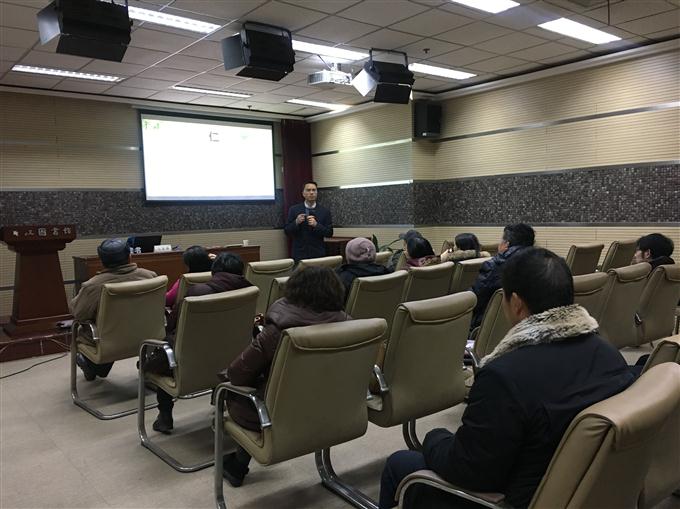 pub:Zhejiang Library
pub:Zhejiang Library  time:2018/02/13
time:2018/02/13  count:40
count:40
On February 10th, during the activity Wen Lan Reading, Mr. Ye Weijun, the vice secretary-general of Tiantiankaixin Reading Club, shared and held discussions on the book Yu Dan's Insights into the Analects with numerous readers in the Wen Lan Hall of Zhejiang Library. After a brief introduction to Confucius lifetime experience, Mr. Ye went straight to the point: Yu Dan's Insights into the Analects. The wisdoms in the Analects of Confucius: behaving oneself, social conduct and founding a state, have long been deeply rooted in Chinese people's minds, and have been engraved into the key components of Chinese national spirits. In retrospect, we will achieve the understanding of Confucius' insurmountable historical status, whose thoughts and wisdoms have tremendous influences on the ideology of the Chinese generation after generation.
Mr. Ye told us that Yu Dan's Insights into the Analects is a bestseller enjoying widespread popularity with the people, accounting for 50% sales volume of Zhonghua Book Company. Compared with some profound books on philosophy, Yu Dan's book is more like her own insights into the mindsets towards life. Mr. Ye made a thorough analysis on "benevolence", the key word of the Confucian school. First and forest, he expound the concept: "The benevolent loves others". As the tenet goes, "Be close and intimate with kinsfolks", hence, filial piety and fraternal duty is the "fundamental of benevolence". The next concept is "Universal love, and benevolence", which implies loyalty and forbearance. What comes next is "to subdue one's self and return to propriety". Thirdly, "benevolence" is the general term for virtues. Confucius said: "To be able to practice five things (gravity, generosity of soul, sincerity, earnestness, and kindness) everywhere under heaven constitutes perfect virtue." In addition, as the supreme ethical principle of human, benevolence can be regarded as the element which governs the moral standards socially and has the equal significance with righteousness, courtesy, intelligence and credit. Fourthly, "benevolence" is the highest spiritual realm for life Confucius pursued endlessly. On the one hand, it is possible for everyone to reach the realm of "benevolence", just as Confucius’ saying "I wish to be virtuous, and virtue is at hand"; on the other hand, as far as he is concerned, it is not easy to be benevolent, just as "The sage and the man of perfect virtue; how dare I rank myself with them?" He even thinks that Yan Hui, of whom he is most proud, is only capable of "for three months there would be nothing in his mind contrary to perfect virtue".
In an effort to help the readers achieve a better understanding, Mr. Ye told the anecdote of Confucius and his disciples. For instance, Confucius thought that lying is not right, however, is it a benevolent behavior or not to lie to bandits in the face of them? One more thing, when seeing the elderly falling over on the road, should we come to their assistance or not? Is it a non-benevolent conduct if the intention of not helping the elderly for fear of being extorted before we actually offer the help come across our minds? Is it a benevolent conduct if the idea (such as receiving a badge or something) that we may possibly gain certain benefits by helping the elderly comes into our minds? All these vivid examples are philosophically profound.
As the keynote speaker, Mr. Ye used simplified and easy-to-understand language, and time and again, he also uttered some fashionable words, which occasionally triggered loud laughter from the audience. With Mr. Ye's vivid and dramatic interpretation, The Analects of Confucius, which by itself is a tedious and dull book, is now transformed into appealing, enormous and thought-provoking philosophies. Through such communication activities for reading, the people are detached from the worldly and mundane trivial matters in life and have a taste of the charms of classical culture and characters.
